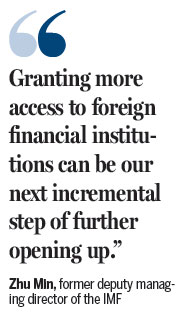China should reduce restrictions on foreign capital, senior economists say

China should further reduce restrictions on foreign investors and advance efforts to continue opening up the financial sector, a former senior official with the International Monetary Fund said on Saturday.
"Granting more access to foreign financial institutions can be our next incremental step of further opening up," said Zhu Min, economist and former deputy managing director of the IMF. "We have pledged to treat foreign and domestic investors equally in certain areas, and now a good time has arrived to take concrete steps."
Some efforts can be made in the short run, include raising the current 25 percent stake of foreign investors in banks and in securities companies, according to a report on Saturday by China Finance Forum 40, a leading think tank.
In the medium to long run, the government should take more steps connecting domestic and foreign bond markets and fully open up the domestic stock market to foreign investors in the future, the report said.
Zhu said the government should also provide greater convenience to foreign investors, making tax and audit policies more compatible with international standards.

While many restrictions have been removed since China started to open up the financial sector in 1978, progress has slowed in recent years, according to Huang Yiping, an economist and central bank adviser.
The share of foreign capital in the Chinese stock market is only around 5 percent compared with around 30 percent in the South Korean market, and foreign capital only accounts for around 2 percent of the Chinese bond market, compared with 10.5 percent in Japan.
"China has reached the right time to further open its borders to more foreign players," Huang said.
More diversified market players help promote economic growth and help dissolve financial risks, according to Huang.
In the meantime, China needs to reduce control over fluctuations in the yuan's exchange rate, gradually allowing the renminbi to float freely against other currencies, according to Zhang Bin, one of the authors of the report.
The report said the government does not need to keep a close eye on the currency on a daily basis.
Rather, the government only needs to intervene when the currency sees a sharp depreciation or appreciation that goes beyond a benchmark of, say, 7.5 percent over a year on either side of a reference rate, the report said.
"Stable economic fundamentals and better market expectations for the yuan's exchange rate paved the way to move ahead," Zhang said. "We should not miss the opportunity. Reform comes at minimal costs when all signs are in favor of reform."
- Surging flu cases drive up demand for drug
- Nanchang funds 19 free funeral venues after tragedy
- Massive ice sculpture replicates CNS?Liaoning aircraft carrier
- China to enhance to improve carbon footprint
- Experts advocate vaccinations to combat flu cases
- Singer Lu Han apologizes for inappropriate behavior





































